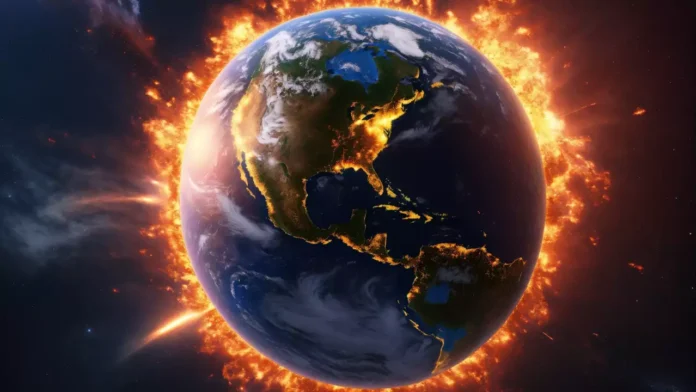Earth’s Hottest Year has been officially recorded in 2024, with global temperatures surpassing critical thresholds that signal an accelerating climate crisis. Weather monitoring agencies worldwide have confirmed that the planet is heating up faster than ever, surpassing the limits established under the 2015 Paris Climate Agreement.
2024: Earth’s Hottest Year On Record
Earth’s global average temperature in 2024 surpassed previous records, breaking the critical limit of 1.5°C above pre-industrial levels, albeit temporarily. The European Commission’s Copernicus Climate Service, the UK Met Office, and Japan’s weather agency collectively reported unprecedented warming trends.
- European Data: Calculated a 1.6°C (2.89°F) increase above pre-industrial levels.
- Japanese Agency: Found a 1.57°C (2.83°F) rise.
- UK Meteorology Office: Reported a 1.53°C (2.75°F) increase.
The global average temperature exceeded the 2023 record, marking a sharp upward trajectory that many experts describe as a “warning light on Earth’s dashboard.”
Catastrophic Impacts Around The Globe
2024’s record heat triggered a cascade of environmental disasters worldwide, leaving nations grappling with the devastating consequences of climate change.
1. Wildfires in California
The Californian city of Los Angeles, including its iconic Hollywood district, faced one of its most destructive wildfire seasons.
- Thousands of homes were destroyed.
- Tens of thousands of people evacuated.
- US President Joe Biden labeled the wildfires the “most devastating” in the state’s history, citing them as undeniable evidence of climate change.
2. Extreme Weather Events
- Hurricane Helene: Wreaked havoc with unprecedented intensity, fueled by rising ocean temperatures.
- Floods in Spain: Severe rainfall caused widespread flooding, disrupting lives and infrastructure.
- Weather Whiplash: Rapid shifts in weather patterns intensified natural disasters, creating an unpredictable and dangerous climate cycle.
The Breach of Climate Thresholds
The year 2024 brought humanity closer than ever to breaching the internationally agreed-upon 1.5°C warming limit. While the 1.5°C threshold has not been permanently surpassed, experts warn that we are “dangerously near” this critical point.
The 2015 Paris Climate Agreement emphasized the importance of limiting global warming to 1.5°C to avoid severe climate impacts. Yet, the last two years (2023 and 2024) exceeded this threshold temporarily, underscoring the urgent need for action.
)
Why Is 1.5°C Significant?
- Staying below 1.5°C reduces the risk of catastrophic weather events.
- Exceeding this limit increases the likelihood of irreversible damage to ecosystems, food supplies, and coastal communities.
Samantha Burgess, Deputy Director of Copernicus Climate, stated, “We are now teetering on the edge of surpassing the 1.5°C threshold.”
What Is Driving The Rapid Warming?
The unprecedented warming of 2024 is attributed to several factors:
- El Niño Effect: The recurring climate pattern contributed to higher global temperatures, amplifying warming trends.
- Greenhouse Gas Emissions: Continued reliance on fossil fuels has driven CO2 levels to record highs, trapping heat in the atmosphere.
- Deforestation and Land Use: Widespread destruction of forests has reduced the planet’s capacity to absorb carbon dioxide.
The European Union’s climate monitoring agency warned that global temperatures are now “beyond what modern humans have ever experienced.”
How Are Governments Responding?
Despite repeated warnings from scientists, global efforts to combat climate change remain insufficient.
- The United States: President Joe Biden has emphasized the reality of climate change, using the wildfires as an example to push for urgent action.
- European Union: Leaders are doubling down on renewable energy goals and carbon neutrality by 2050.
- Paris Agreement Goals: Around 200 nations continue to struggle to align their actions with the commitments made in 2015.
However, current trajectories indicate that these measures are far from enough to meet the 1.5°C target.
The Human and Environmental Toll
The consequences of global warming extend far beyond rising temperatures:
- Biodiversity Loss: Ecosystems worldwide are under threat as species struggle to adapt to changing climates.
- Food and Water Scarcity: Droughts, floods, and erratic weather patterns are disrupting agriculture and freshwater supplies.
- Health Risks: Heatwaves and air pollution are increasing the incidence of respiratory and cardiovascular diseases.
The wildfires in California alone highlight the human toll of climate inaction, with thousands displaced and billions of dollars in damages.
A Call For Immediate Action
Experts stress that the 2024 record should serve as a wake-up call for global leaders, corporations, and individuals.
- Accelerate Renewable Energy Adoption: Transitioning to wind, solar, and other renewable sources can significantly reduce greenhouse gas emissions.
- Reforestation Efforts: Large-scale tree planting initiatives can help sequester carbon and restore ecosystems.
- Global Cooperation: Nations must work together to ensure equitable and effective climate solutions.
Marshall Shepherd, a meteorology professor, warned, “This is a warning light going off on the Earth’s dashboard that immediate attention is needed.”
The Path Ahead
As 2024 becomes Earth’s hottest year on record, the need for decisive action has never been more urgent. While the challenges are immense, the tools and knowledge to combat climate change are available.


